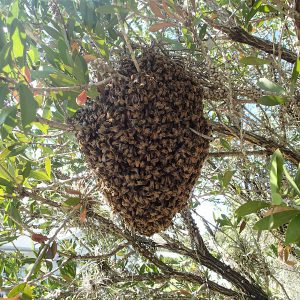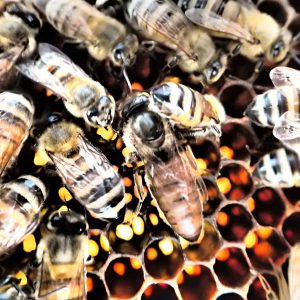The business of bees
Honey Bees are everywhere in Highlands County. It’s that time of year when the bees are busy making honey. Because Highlands County produces so much citrus and citrus produces a heavy nectar flow, the beekeepers come with their bees in droves. Citrus doesn’t benefit from the beekeepers as much as the beekeepers benefit from the honey. Citrus is mostly self pollinating, benefiting from a perfect flower, it needs little help. Orange Blossoms have an abundance of nectar and the result is a premium honey. Some would argue the best honey you can get.

Bees, bees everywhere!
Something else happens while the honey bees visit our orange blossoms; spring swarms. Swarms are a natural honey bee occurrence where the queen bee leaves the hive with a substantial number of the flying and worker bees. It’s one of the ways honey bees ensure the survival of their species. She will hang in a nearby tree with the bees surrounding her in a large cluster. During the next 1 to 3 days, worker scout bees will search the area for a new spot to call home. During this transition the bees are not aggressive but actually very docile. Bees are generally only aggressive when they believe the hive is being threatened. During the swarm they have no hive to protect. Homeowners might be very nervous when the swarm shows up in their yard. All you need is a willing beekeeper; many of them will come and scoop the swarm into one of their boxes. To find a beekeeper contact your local extension office and they’ll have someone come over and take a look. In Highlands County the number is (863) 402-6540 or click here to find a link to your Florida County Extension service.
The benefits of royalty
The remaining bees left in the hive choose several eggs or young larva less than three days old and form queen cells around them. The queen cell is larger and hangs downward. The larvae in the queen cells are exclusively fed royal jelly. Royal jelly is a substance produced from a gland within the head of a certain aged nurse bee that is richer than what is fed worker bees. The queen will develop five days earlier than a female worker bee and live much longer. While a worker bee develops in its cell in 21 days, the queen only takes 16. Worker bees live around 45 days after emerging, the queen can often live 2 years or more. Being fed royal jelly makes the difference in how the queen develops; which may be the reason people seek it out as a health supplement, hoping to find the same fountain of youth that the queen enjoys. Only one of these new queen cells will hatch the lucky new queen. Usually the first new queen to hatch, she will dig the other potential queens out of their cell and kill them. Unlike the worker bees which can only sting once, she has a smooth stinger and can utilize it over and over. After this rather unladylike encounter with her sisters, she will probably never use the stinger again for that purpose. She will use it to lay eggs since the stinger on a bee is also their ova depositor. This explains why male bees, known as drones, don’t have stingers. After several days of drying out and familiarizing herself with the hive she will be ready to take a mating flight. Returning to the hive mated, the queen becomes the mother of all the bees in the hive and within two months from the time she hatches almost every remaining bee is one of her young.

Become a Beekeeper!
If you are interested in becoming a beekeeper, Highlands County is the home to the Heartland Beekeepers association. They meet once a month in Conference room 2 of the Bert J Harris Agricultural Civic Center on the third Thursday at 7 pm. Most attendees are backyard beekeepers and the public is always welcome. Like my Facebook page, Hometown Gardener, and join our Facebook groups, Heartland Beekeepers, Highlands County Master Gardeners, and Central Florida Butterfly and Pollinator Club. That’s what’s new from the Hometown Gardener.
 0
0
